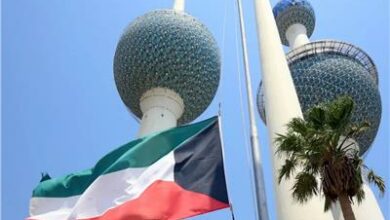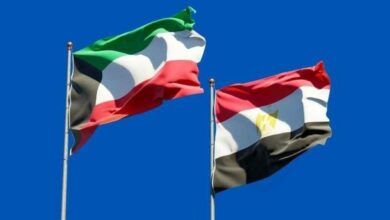
Kuwaiti security forces detained at least five people, including the son of a prominent opposition figure, at an anti-government protest against possible changes to an election law, witnesses said on Tuesday.
Several people were hurt in skirmishes at the rally, attended by at least 5,000 people who defied a request by authorities to cancel the Monday night demonstration.
Although Kuwait has avoided the mass Arab Spring protests seen elsewhere in the region, tensions have escalated between the major oil producer's elected parliament, where the majority opposition bloc is made up of Islamist and tribal lawmakers, and the cabinet which is dominated by the ruling Sabah family.
One of Kuwait's main opposition groups called for a sit-in outside parliament on Tuesday to protest the arrests.
In some of the strongest remarks by an opposition figure, former lawmaker Musallam al-Barrak appealed directly to Kuwait's Emir Sheikh Sabah al-Ahmad al-Sabah to avoid "autocratic rule."
His speech to the crowd contained extremely rare criticism of the 83-year-old emir, which analysts said could spark a strong reaction from the authorities.
The son of Ahmed al-Saadoun, another prominent opposition leader and former parliament speaker, was among those detained during the protest near parliament, where several anti-government demonstrations have taken place in the past year.
"In the name of the nation, in the name of the people, we will not let you, your highness, … practice autocratic rule," Barrak told the rally in a speech addressed to the emir.
His remarks, including the criticism of the emir, drew repeated chants of "we will not let you, we will not let you" from the crowd.
Sheikh Sabah dissolved parliament last week and opposition figures say they fear the government will try to push through legislation before elections expected before the end of the year, including voting rules that help pro-government candidates perform well in the polls.
"I think the opposition is building up fear for political reasons. They are in election campaigning mode," a Kuwait-based diplomat said.
"I would find it very surprising if the government tried to push through changes by decree," the diplomat said, adding that the tense atmosphere was likely to remain until the vote.
Skirmishes
Although Kuwait allows more freedom of speech than some of its fellow Gulf states, the emir is seen as untouchable and is referred to as "immune and inviolable" in the constitution.
"The incendiary public accusations directed by Musallam al-Barrak at the emir of Kuwait are a milestone in the country," Gulf expert Kristian Ulrichsen at the London School of Economics, wrote on Twitter.
Witnesses at the protest, where police in full riot gear were deployed, said at least five people were arrested. Security is tight as Kuwait is hosting Asian leaders for a summit.
"A number of instigators of rioting and violence were arrested outside of the [square] and they were taken to the relevant authorities where necessary actions have been taken against them," the Interior Ministry said in a statement.
Several people, including police, were injured when demonstrators clashed with police as they tried to spread into a barricaded street. Kuwaiti media published pictures of lines of police confronting Kuwaitis in white garb holding up railings.
"We are entering into the start of a confrontation," economic analyst Adnen al-Delemi said, adding that the government's promised economic reforms were now a distant hope because of the turmoil.
Last year, scores of angry Kuwaitis stormed parliament demanding the resignation of the then prime minister, Sheikh Nasser al-Mohammad al-Sabah, heralding one of the most serious recent crises in the country.
The latest row began in June when Kuwait's top court annulled the most recent election, held in February, which gave mainly Islamist lawmakers a majority in parliament, and reinstated the previous, more government-friendly, assembly.
Sheikh Sabah ordered the dissolution of that parliament last week after months of political deadlock. Under the constitution, elections must be held within 60 days of dissolution, but there has been no date announced so far.



